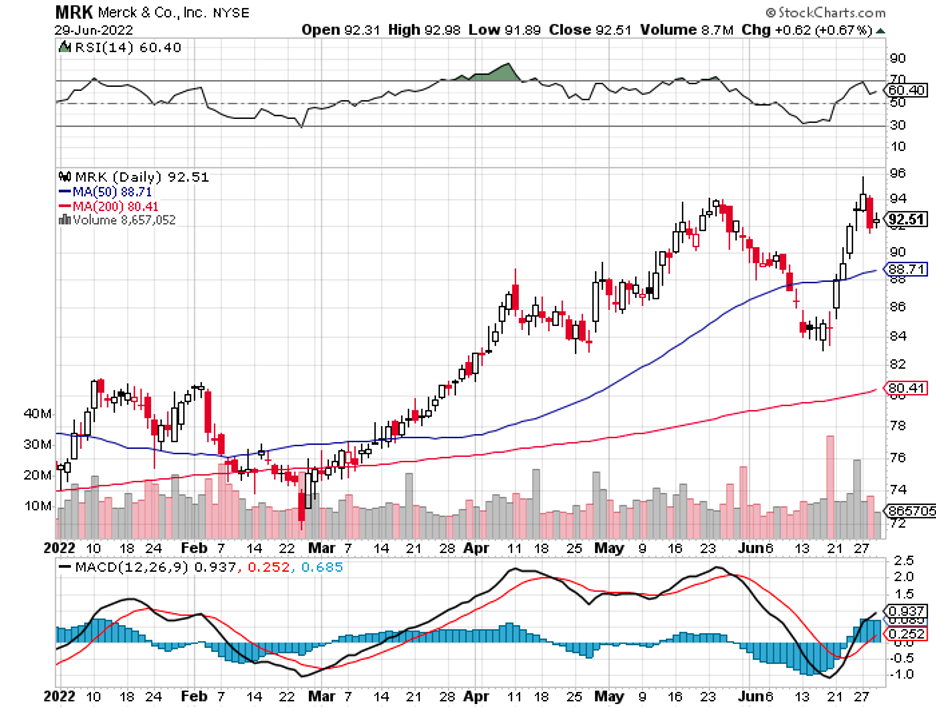A Solid Biopharma With A Gamechanger Up Its Sleeve
The mounting uncertainty over fears of a global recession, heightened volatility, and ongoing geopolitical concerns resulted in the decline of the S&P 500 index, pushing it towards a bear market.
In this type of environment, investors can lean on solid dividend stocks to smooth out losses and generate some much-needed passive income.
A great biotechnology and healthcare stock that fits the bill is Merck (MRK).
For one, Merck’s business is solid, rising by 23% year-to-date. The company, with a market capitalization of $233 billion, is the fifth-biggest pharma stock globally.
It develops products for humans and animals, excelling and becoming a frontrunner in both fields.
Among its programs, the most noteworthy is the top-selling cancer drug Keytruda. This product continues to gain more indications despite already having over two dozen regulatory approvals under its belt.
In 2021, Merck launched five blockbuster products. Even its animal health sector posted double-digit growth in net sales for that period.
This also included its COVID-19 antiviral treatment, Lagevrio, which raked in $3.2 billion in sales in the first quarter of 2022 alone.
Merck also has roughly 77 programs queued for Phase 2 trials and 29 more for Phase 3 studies in its pipeline. These cover diverse projects ranging from vaccines, cardiovascular, and diabetes treatments to oncology and endocrinology therapies.
Needless to say, the continuous expansion of the company’s drug portfolio bodes well for its future. Moreover, Merck offers investors a 2.9% dividend yield.
To put that in perspective, 2.9% is about twice the S&P 500’s 1.6% yield.
While Merck is considered one of the top companies in the healthcare industry, reporting almost $50 billion in revenue in 2021, the business has been missing something in the past years: a big growth catalyst.
Despite its solid performance and steady expansion of existing products, Merck’s sales have only increased by roughly 15% from 2019 to 2021.
This might change soon.
Merck has been persistently linked with biotech company Seagen (SGEN) in an effort to bolster its oncology portfolio.
If this plan pushes through, it could be a massive game-changer for both companies.
With a market capitalization of over $32 billion, buying Seagen won’t be cheap for Merck. More than that, other names are supposedly interested in acquiring this company as well. However, it looks like Merck has the best shot at actually sealing the deal.
Growing its revenues impressively over the past 10 years, Seagen is an attractive target for any Big Pharma.
In fact, this biotech has grown from raking in only roughly $200 million in revenue in 2012 to $1.57 billion in 2021. It has also since then expanded its portfolio and broadened its pipeline. This means that the company’s 2027 revenue estimate of $6.9 billion and $10.2 billion by 2031 are within reach.
Seagen would be an excellent fit for Merck because of the overlapping interests of both businesses.
The deal would expand Merck’s oncology footprint, bolster its foothold in the market, and introduce new technology to its pipeline while simultaneously allowing Seagen to inject substantial cash flow to sustain and bring to market its innovative programs.
If this goes through, the deal would be expected to benefit Merck in the same way AstraZeneca (AZN) benefited from Alexion, AbbVie (ABBV) with Allergan, and Bristol-Myers Squibb (BMY) with Celgene.
While it’s risky to speculate on a potential acquisition, Merck remains a good buy regardless of the plans with Seagen.
Considering that the company’s dividend payout ratio is projected to be at 38% in 2022, its dividend seems to be safe and should be able to increase almost as fast as its earnings.
This means Merck could reasonably deliver high-single-digit yearly dividend growth, making it a stock with an excellent combo of income on the side and high growth potential.

